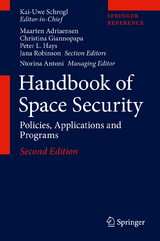
Handbook of Space Security
Springer-Verlag New York Inc.
978-1-4614-2028-6 (ISBN)
- Titel erscheint in neuer Auflage
- Artikel merken
The Handbook will provide a sophisticated, cutting-edge resource on the space security policy portfolio and the associated assets, assisting fellow members of the global space community and other interested policy-making and academic audiences in keeping abreast of the current and future directions of this vital dimension of international space policy. The debate on coordinated space security measures, including relevant 'Transparency and Confidence-Building Measures,' remains at a relatively early stage of development. The book offers a comprehensive description of the various components of space security and how these challenges are being addressed today. It will also provide a number of recommendations concerning how best to advance this space policy area, given the often competing objectives of the world's major space-faring nations. The critical role to be played by the United States and Europe as an intermediary and "middle diplomat" in promoting sustainable norms of behavior for space will likewise be highlighted.
In providing a global and coherent analytical approach to space security today, the Handbook focuses on four areas that together define the entire space security area: policies, technologies, applications, and programs. This structure will assure the overall view of the subject from its political to its technical aspects. Internationally recognized experts in each of the above fields contribute, with their analytical synthesis assured by the section editors.
Dr. Kai-Uwe Schrogl is the Head of the ESA Policies Department in the European Space Agency (ESA, Headquarters in Paris, France) since 2011. From 2007 to 2011 he was the Director of the European Space Policy Institute (ESPI) in Vienna, Austria. Prior to this, he was the Head of the Corporate Development and External Relations Department in the German Aerospace Center (DLR) in Cologne, Germany. Previously he also worked with the German Ministry for Post and Telecommunications and the German Space Agency (DARA) in Bonn, Germany. He has been a delegate to numerous international forums and recently served as the chairman of various European and global committees (ESA International Relations Committee and two United Nations Committees on the Peaceful Uses of Outer Space, UNCOPUOS, plenary working groups). He presented, respectively testified, at hearings of the European Parliament and the U.S. House of Representatives. Kai-Uwe Schrogl has written or co-edited 12 books and more than 130 articles, reports and papers in the fields of space policy and law as well as telecommunications policy. He is editor in chief of the “Yearbook on Space Policy” and the book series “Studies in Space Policy” both published by ESPI at SpringerWienNewYork. In addition he sits on editorial boards of various international journals in the field of space policy and law (Acta Astronautica, Space Policy, Zeitschrift für Luft- und Weltraumrecht, Studies in Space Law/Nijhoff). Kai-Uwe Schrogl is a Member of the Board of Directors of the International Institute of Space Law, Member of the International Academy of Astronautics (recently chairing its Commission on policy, economics and regulations) and the Russian Academy for Cosmonautics. He holds a doctorate degree in political science and lectures international relations at Tübingen University, Germany (as an Honorary Professor). He has been a regular lecturer at, for example, the International Space University (where he serves as Adjunct Faculty) and the European Centre for Space Law’s Summer Courses.Kai-Uwe Schrogl is the Head of the ESA Policies Department in the European Space Agency (ESA, Headquarters in Paris, France) since 2011. From 2007 to 2011 he was the Director of the European Space Policy Institute (ESPI) in Vienna, Austria. Prior to this, he was the Head of the Corporate Development and External Relations Department in the German Aerospace Center (DLR) in Cologne, Germany. Previously he also worked with the German Ministry for Post and Telecommunications and the German Space Agency (DARA) in Bonn, Germany. He has been a delegate to numerous international forums and recently served as the chairman of various European and global committees (ESA International Relations Committee and two United Nations Committees on the Peaceful Uses of Outer Space, UNCOPUOS, plenary working groups). He presented, respectively testified, at hearings of the European Parliament and the U.S. House of Representatives. Kai-Uwe Schrogl has written or co-edited 12 books and more than 130 articles, reports and papers in the fields of space policy and law as well as telecommunications policy. He is editor in chief of the “Yearbook on Space Policy” and the book series “Studies in Space Policy” both published by ESPI at SpringerWienNewYork. In addition he sits on editorial boards of various international journals in the field of space policy and law (Acta Astronautica, Space Policy, Zeitschrift für Luft- und Weltraumrecht, Studies in Space Law/Nijhoff). Kai-Uwe Schrogl is a Member of the Board of Directors of the International Institute of Space Law, Member of the International Academy of Astronautics (recently chairing its Commission on policy, economics and regulations) and the Russian Academy for Cosmonautics. He holds a doctorate degree in political science and lectures international relations at Tübingen University, Germany (as an Honorary Professor). He has been a regular lecturer at, for example, the International Space University (where he serves as Adjunct Faculty) and the European Centre for Space Law’s Summer Courses.
Part 1: International Space Security Setting.- Introduction.- Chapter 1: Defining Space Security.- Chapter 2: Key Space Security Policy Issues.- Chapter 3: Space and Cyber Security.- Chapter 4: Space Safety.- Chapter 5: Space Sustainability.- Chapter 6: Spacepower Theory.- Chapter 7: Discussion on Space Weaponization.- Chapter 8: The Role of Space in Deterrence.- Chapter 9: Obstacles to International Space Governance.- Chapter 10: International Code of Conduct for Outer Space Activities.- Chapter 11: Space Transparency and Confidence-Building Measures.- Chapter 12: Space Traffic Management.- Chapter 13: The Laws of War in Outer Space.- Chapter 14: Active Debris Removal and On-Orbit Servicing.- Chapter 15: Space Technology Export Controls.- Chapter 16: Responsive Space.- Chapter 17: Space as a Critical Infrastructure.- Part 2: Space Security Policies and Strategies of States and International Organizations.- Introduction.- Chapter 1: U.S. Space Security Priorities:War, Policy, and Spacepower.- Chapter 2: Space Security in Russia.- Chapter 3: Chinese Space Policy: Current Status and Road Ahead.- Chapter 4: Chinese Concepts of Space Security.-Chapter 5: Space and Security in Europe.-Chapter 6: Space Security in Japan.- Chapter 7: U.S. – Japan Space Security Cooperation.- Chapter 8: Space Security in India.- Chapter 9: Israeli Perspectiv on Space Security.- Chapter 10: Brazilian Perspective on Space Security.-Chapter11: Space Security-Relevant International Organizations: UN, ITU, ISO.- Chapter 12: Space Security Through the Transatlantic Partnership.- Chapter 13: External View of Space Security in Europe.-Chapter 14: U.S. Space Security and Allied Outreach.- Part 3: Space Applications for Security and Defense.- Introduction.- Chapter 1: Earth Observation for Security & Dual Use.- Chapter 2: Earth Observation for Defense.- Chapter 3: Telecommunications for Security & Dual Use.- Chapter 4: Telecommunications for Defense.- Chapter 5: Positioning, Navigation & Timing for Security and Defense.- Chapter 6: Eavesdropping.- Chapter 7: Integrated Space Related Applications for Security and Defence.- Chapter 8: Space Situational Awareness and Recognized Picture.- Chapter 9: Various Threats of Space Systems.- Chapter 10: Issues of Space Debris.- Part 4: Space Security Programs Worldwide.- Introduction.- Chapter 1: United States Space Launch Programs.- Chapter 2: European Space Launch Capabilities and Prospects.- Chapter 3.- Russian Space Launch Program.- Chapter 4: Japanese Space Launch Program.- Chapter 5: Chinese Space Launch Program.- Chapter 6: Indian Space Launch Program.- Chapter 7: Space Launch Programs in Emerging Countries: Brazil.- Chapter 8: Satellite Programs in the United States.- Chapter 9: European Institutional Satellite Programs.- Chapter 10: European Member States Satellite Programs.- Chapter 11: European Multinational Satellite Programs.- Chapter 12: Russian Satellite Programs.- Chapter 13: Japanese Satellite Programs.- Chapter 14: Chinese Satellite Programs: An Internal View.- Chapter 15: Chinese Satellite Programs: An External View.- Chapter 16: Indian Satellite Programs.- Chapter 17: Satellite Programs in Emerging Countries: The Pacific Region.- Chapter 18: Satellite Programs in Emerging Countries: South America Region.- Chapter 19: The Proliferation of Space Capabilities: Implications for Space Security.- Chapter 20: Space Weapons’ Concepts and their International Security Implications.- Chapter 21: SSA Concepts Worldwide.
| Reihe/Serie | Handbook of Space Security | 1.10 |
|---|---|
| Zusatzinfo | 143 Illustrations, color; 35 Illustrations, black and white; XLI, 1036 p. 178 illus., 143 illus. in color. In 2 volumes, not available separately. |
| Verlagsort | New York, NY |
| Sprache | englisch |
| Maße | 155 x 235 mm |
| Themenwelt | Informatik ► Netzwerke ► Sicherheit / Firewall |
| Recht / Steuern ► EU / Internationales Recht | |
| Technik ► Bauwesen | |
| Technik ► Fahrzeugbau / Schiffbau | |
| Technik ► Luft- / Raumfahrttechnik | |
| Schlagworte | International space relations • Security associated technology • security policy • Security policy objectives • space policy • Space policy development • Space programs • Space security • Space security challenges • Space security measures |
| ISBN-10 | 1-4614-2028-8 / 1461420288 |
| ISBN-13 | 978-1-4614-2028-6 / 9781461420286 |
| Zustand | Neuware |
| Haben Sie eine Frage zum Produkt? |
aus dem Bereich



